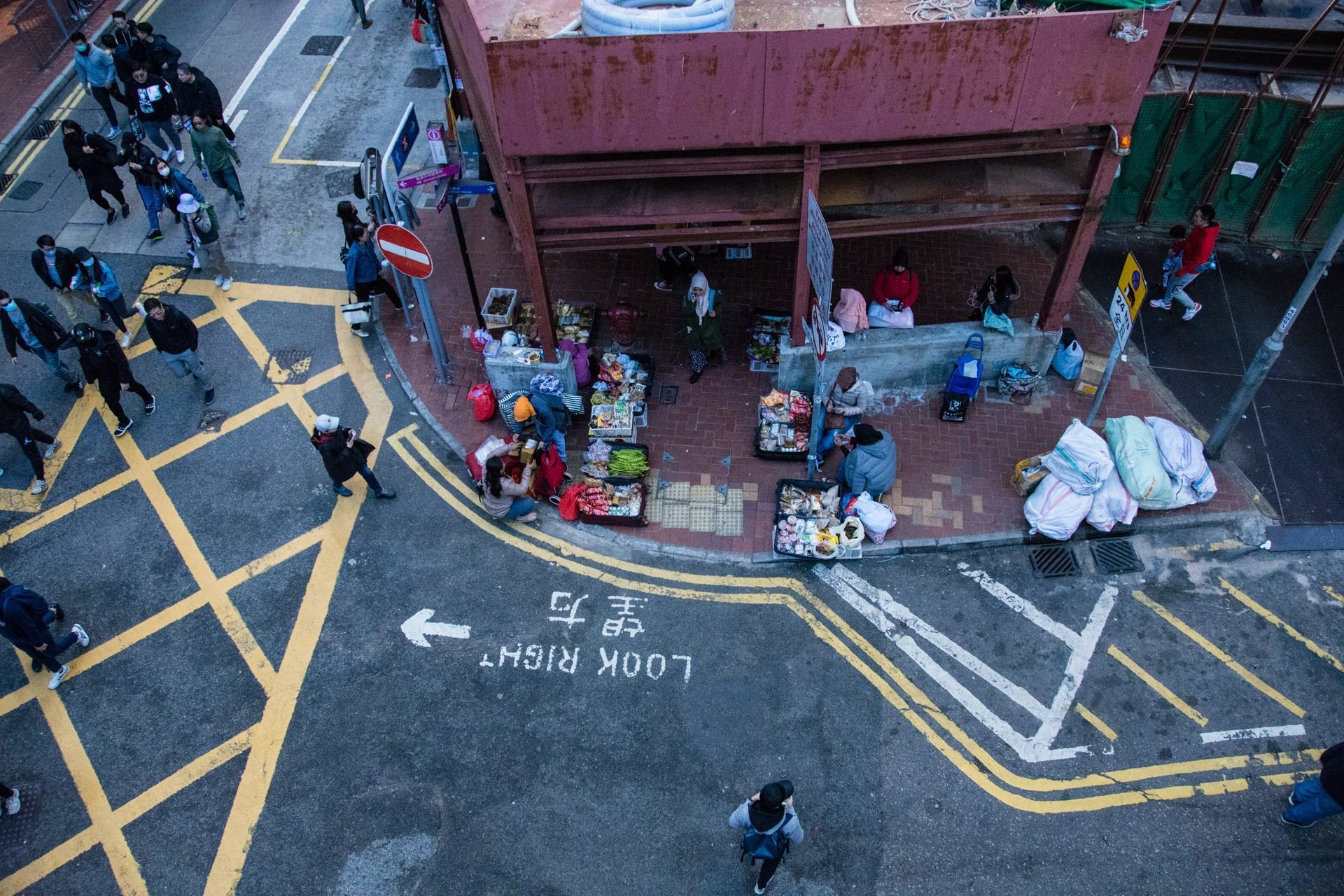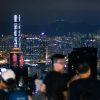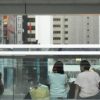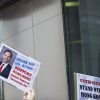Original: 【活在兩地夾縫中的菲律賓移工— 再思國際連結】, published in 中大學生報 Chinese University Student Press
Translators: Cherie Cheuk. Y. Chan, A. Yang, Pak Go
This article has been edited for precision and clarity. If you would like to be involved in our translation work, please get in touch here.
Does everyone remember when, in the midst of the anti-extradition law protests, former Chief Executive C.Y. Leung called on migrant domestic workers (MDW) to inform on employers in possession of “offensive weapons” (protest equipment)? Leung even called for migrant workers to spread the word that there would be a cash reward for anyone who came forward with information. In response, the Employers of Overseas Domestic Helpers Association argued that migrant workers came to Hong Kong to work, rather than to participate in politics; as such, they would not sacrifice their employment toward the cause of so-called “justice.” Even if some workers became informants, they would only be doing it to obtain the large cash reward. Throughout the ordeal, MDWs’ voices largely went unheard. Already exploited on multiple fronts, these workers were portrayed as being wholly self-interested and apolitical.
But does this image correspond to reality? As a matter of fact, MDWs in Hong Kong do participate in social movements. Shiela Tebia is an MDW from the Philippines, who also serves as the Chairperson of the Hong Kong branch of the National Alliance of Filipino Women, Gabriela. For the last five years, she has used her Sundays off to provide support to other domestic workers. We conducted this telephone interview with Shiela while she was in her employer’s home, during a short rest break—our conversation was cut short when she had to leave for work.
Gabriela HK organizes workshops, discussion groups, and legal support, in order to raise workers’ awareness of their rights as well as the political situation in the Philippines, and bring together labor power to combat wage exploitation, misogyny, homophobia, and other forms of oppression. In addition, the organization holds large-scale marches, for example the Migrant Pride Parade. Migrant workers, too, bear the spirit of resistance.
The impression that many Hongkongers have of the wholly self-interested MDW actually reflects how these workers have been situated in a position of economic precarity that has only been exacerbated by how they are treated in Hong Kong. When we call for international support in our movement, have we ever paid attention to the struggles of others, or recognized Hong Kong’s positionality in these struggles, and paid our dues within the global community? Do we know what Filipino MDWs are fighting for in their struggles? What kinds of oppression do they face in both the Philippines and in Hong Kong?
Economic troubles in the Philippines
The Philippines has the highest homeless population and the highest unemployment rate of all countries in Southeast Asia. In 2019, 22 million people lived below the national poverty line. The country also has one of the biggest wealth gaps in the region. Neoliberal policies have dominated the country for ten years: the government has gutted social services, and the provision of basic necessities has been left to the vicissitudes of the free market, leading to exorbitant costs for education, electricity, and housing. 42.3% of urban dwellers live in slums, as many are unable to afford the cost of rent for a house. Meanwhile, the government keeps tens of thousands of public housing units uninhabited.
Migrant workers, too, bear the spirit of resistance. Do we know what they are fighting for in their struggles? What kinds of oppression do they face in both the Philippines and Hong Kong? Have we recognized Hong Kong’s positionality in these struggles, and paid our dues within the global community?
During our interview, Shiela criticized the current President of the Philippines, Rodrigo Duterte, of extending his predecessor Benigno Aquino III’s neoliberal policies, with the aim of bolstering the strength of multi-national and local business conglomerates. While Duterte’s 8-point economic agenda did result in a rapid increase in the country’s infrastructure investment and a growth in GDP, it also led to the outsourcing of many social services. Problems of structural unemployment, low wages, and lack of benefits have continued to fester.
Furthermore, in the name of the ‘war on terror’ and the ‘war on drugs’, Duterte has escalated his attacks on labor unions and civil society organizations. He has placed organizations that support indigenous people’s rights, women’s rights, and human rights on a ‘terrorist’ hit list. His repressive actions include calling on the Commission on Election to void the Gabriela Women’s Party, and its nominated leader’s, registration. He has even gone so far as to kill his own people and those fighting for human rights, while ignoring the need for fair trials.
The delusion of democracy
The Philippine presidential system is supposedly founded on a democratic voting process. In reality, the voting landscape is controlled by local elites and a network of deeply entrenched American capital interests. According to one study of the 2016 Philippines national election, 81% of provincial governor and vice-governor positions, and 78% of house of representative seats went to people from “political dynasties.” In every election, the same few family names crop up—these nominees use money and political favors to win an easy victory. Elections have become monopolized by a select group of families, turning into a game between elites.
Duterte himself was born into a political dynasty, with a stronghold in the southern part of the Philippines. His father was the governor of Davao. In the 2016 presidential elections, Duterte won the support of the masses by calling for the abolition of temporary work contracts. But he secured his victory by gaining the backing of the most reactionary elements of the capitalist classes, such as the Filipino Chinese General Chamber of Commerce and other corporate entities. From this perspective, Duterte’s implementation of pro-capitalist, neoliberal policies after taking office becomes easy to understand.
Since the 16th century, the Philippines has been subject to multiple waves of colonization. Local elites and prominent families have maintained and strengthened their political and economic power through colluding with colonial powers. In turn, these colonizers have used those connections to tighten their grip over the country.
The voting landscape is controlled by local elites and a network of deeply entrenched American capital interests. Elections have become monopolized by a select group of families, turning into a game between elites.
In 1946, the United States granted the Philippines its independence, but only under the conditions that the country engage in free trade, and follow a fixed exchange rate between the Philippine peso and the American dollar, so that American companies would not suffer the effects of devaluation. In 1949, as American investment began to decrease, the Phillipine government imposed strict measures to control foreign exchange rates and to prevent a massive outflow of capital. However, after the Nacionalista Party (the conservative party) won a majority of congressional votes in 1959, it eliminated controls on capital movement. Having waited for an opportunity to open up the Philippines, the IMF and the US government expressed their enthusiastic support for the Party by providing the country with a US$300 million loan. This loan effectively allowed the IMF and the US government to take control of the Philippine economy. From 1962 to 1969, the country’s external debt increased sevenfold, to US$1.88 billion dollars. Government borrowing continued to increase.
With the backing of the US government, the IMF, the World Bank, and the Nacionalista Party, Ferdinand Marcos was able to set up his dictatorship in 1972. His goal was to use martial law to strengthen the country’s neoliberal policies, for which the IMF and the World Bank openly expressed their support. These two international organizations continued to impart pressure on subsequent Philippine presidents, which is why the Philippines continues to pursue neoliberal economic policies today.
Ever since, the Philippines’ political ecosystem has been dominated by collusive alliances on the part of the US government, IMF, and local elites, who have ensured that elections will continue to shore up political dynasties. Today, four corporations owned by local bosses and their American partners have a monopoly over electricity generation; they have also violently expropriated indigenous lands in order to develop farming and mining industries.
“The Filipino people have the right to vote for their president, but the people have no voice. Any prospect of social change depends on whether the President is able to fulfill his campaign promises. On the surface, he has the support of the people—in reality, all he has is the financial support of the capitalist classes.” Shiela’s words encapsulate Filipino people’s feelings of frustration and helplessness at the plutocracy and the failure of democracy in the Philippines.
The emergence of migrant workers
All of this seemingly faraway political context is actually closely related to the condition of MDWs in Hong Kong. In the Philippines, neoliberal policies have caused widespread unemployment and underemployment, leading many people to seek jobs abroad, including in Hong Kong.
Although many American capitalists have made investments in the Philippines, promising to enhance local productivity, they have in fact failed to create any new industries, instead scalping local resources for their own development projects. In the Philippines, there are tens of processing export zones designed to attract foreign investment, specifically to support the building of factories. Commonly, each factory signs hiring contracts with several different labor agencies. To prevent contractors from becoming full-time employees entitled to basic workers’ rights, employers renew short-term contracts with workers every six months. Almost half of all local workers have to look for new jobs every 6 months.
With anger in her voice, Shiela explained, “Filipinos want to reclaim our economic autonomy. We reject the domination of foreign investors over our local companies. We believe that our country’s resources belong to the people; locals should benefit from them more than foreign investors. The Philippines is a country with abundant natural resources. In reality, we have no need for the US’ assistance in our financial and economic development. We don’t need world powers to provide us with so-called help. These powers simply want to exploit the Philippines to obtain greater benefits for themselves.”
We reject the domination of foreign investors over our local companies. We believe that our country’s resources belong to the people. We have no need for the US’ assistance in our financial and economic development. We don’t need world powers to provide us with so-called help.
Based on Shiela’s observations, the majority of job opportunities in the Philippines are granted to male workers. However, many fathers and sole financial providers can only be contractors, thereby unable to fully support the household. More than 44% of paid laborers in the country are informal workers. Almost half of the working population earn less than the minimum wage. And so the women in the household have to go abroad to seek work, becoming migrant workers.
Every year, migrant workers remit almost US$30 billion back to the Philippines, comprising 12% of the country’s GDP. This is a crucial chunk of the Philippines’ foreign source income, even though it is routinely ignored.
“The government has long neglected migrant workers, failing to consider them at all in its policymaking,” Shiela continued. “Many migrant workers experience sexual abuse in the Middle East; and yet, the government has never made good on its promise to generate employment opportunities in the countryside. In order to provide for their families, many MDWs have no choice but to stay where they are.” Shiela also points out that after Duterte purchased the social security system system between 2017 and 2018, it became mandatory for migrant workers to enroll in the PhilHealth insurance program. Yet, the program does not cover workers in Hong Kong. On top of the health insurance purchased through their employers in Hong Kong, this will only add a greater financial burden onto MDWs’ shoulders.
Migrant workers face a no-win situation in Hong Kong
The labor and worker outflow from the Philippines coincide with Hong Kong people’s need for domestic labor, culminating in the current landscape in Hong Kong, where over half of our domestic workers are Filipino. It is the responsibility of the government to provide for child-care services in order to unleash the labor potential of people whose current full-time job is to take care of their children. But the government has instead left it up to the free market, resulting in a dearth of public child-care services, with an average of 220 kids vying for a single spot. This means that the only option for many families is to hire a domestic worker. The monthly salary for a local nanny ranges from HK$7,000 to HK$10,000 whereas the minimum monthly salary for an MDW is only HK$4630. It is clear, then, why the latter would be many people’s top choice.
When these MDWs come to Hong Kong, they do not receive fair treatment. Similar to the Philippines, Hong Kong also touts neoliberal policies with familiar mantras like “big market, small government” and “no interference.” For many years, Hong Kong has maintained low rates of taxation, and refused to legislate standard working hours, collective bargaining rights, or a universal pension scheme.
In the context of this general disregard for labor rights, foreign workers get the short end of the stick. Foreign workers are forced to pay unregulated broker fees to recruitment agencies, which pushes them into greater debt. These agencies often withhold their documents illegally until they are able to settle their debt, meaning that workers cannot return to the Philippines in the meantime.
Hong Kong has maintained low rates of taxation, and refused to legislate standard working hours, collective bargaining rights, or a universal pension scheme.
In addition, the law stipulates that MDWs must reside with their employer. This law creates situations where an abused worker cannot escape, and where work hours are not clearly defined, leading many domestic workers to be at the beck-and-call of their employer, 24 hours a day. Perhaps the cruelest treatment a worker can experience is when employers decide to terminate their employment contract before it officially ends, leaving workers only two weeks to find new employment and register for work authorization before they are forced to leave Hong Kong. With this looming over their heads, many workers are forced to silently endure abusive treatment.
In addition to barren labor protections and predatory regulations at work, MDWs are also met with backlash when they engage in protests. For example, when a group of workers protested Duterte’s visit to Hong Kong, they faced repression from the Hong Kong police as well as rebukes from the Philippine consulate, who jointly arranged outsized security measures to manage a peaceful protest. MDWs fall into the cracks of both the Hong Kong and Philippine neoliberal economy, and yet are forced to endure suppression from both of these governments. They endure privation in Hong Kong and a lack of jobs in the Philippines. In other words, no matter where they may turn, there is no way out.
Hong Kong’s international responsibilities
Hong Kong occupies a favored position in the international neoliberal order: in the global supply chain, the city has a strong hold over value-added industries, such as the financial industry. The Philippines, on the other hand, occupies a completely different position. Over half of foreign investment goes into manufacturing, and countries such as the US exploit local workers and extract local resources for their own benefit. Hong Kong plays a role in this too in its treatment of Filipino domestic workers as cheap imported labor.
Whether we look at the situation from the perspective of Hong Kong’s role in the international community, or from the perspective of the exploitation of migrant workers, Hong Kong people cannot ignore their responsibility to fight for the rights of Filipino domestic workers. Last summer, Hong Kong people called for global support for the anti-extradition bill movement, and demanded the international community live up to its responsibilities. Have we reflected on whether, and how, we could use our position in the international community to press for MDW rights in turn?
During the movement in Hong Kong last year, protesters actively sought to network on a global scale. Some protesters were seen carrying US and U.K. national flags. In addition, the Hong Kong Higher Institutions International Affairs Delegation (HKIAD) made several overseas trips for international support. Among several achievements, the project that enjoyed the highest profile has been the Hong Kong Human Rights and Democracy Act (HKRDA) enacted by the US Congress. The passing of this federal law demonstrated the strength of connection between Hong Kong activists and what the CCP would call “foreign forces.” Such international connections are definitely important. Yet, why do we only network mostly with powerful countries in the West? Usually, the justification is that the US is a useful ally in the international sphere, being the world’s largest economy. By connecting with the US, Hong Kong can bring its domestic issues to the world stage. Together, Hong Kong and the US can form an alliance against the CCP.
For decades, the US has been engaging in military-backed suppression in Latin America, the Middle East and Asia. Its pervasive control over the Philippines is only the tip of the iceberg. It is obvious that what the US government has done is in diametrical opposition to such values as democracy.
Nonetheless, support from the US cannot bring forth practical outcomes in Hong Kong. The HKHRDA can only sanction already-blacklisted officials when they try to apply for a visa to the US, or when they seek to buy and sell real estate in the country. In reality, these passive actions do nothing to advance the movement. Moreover, China and the US are co-dependent financially. The US is unlikely to jeopardize its diplomatic and trade relations with the Hong Kong and Chinese governments. In the end, it will only choose to stand with the party that brings it the most economic benefit.
The enemy of my enemy is not necessarily my friend. Connecting with the US is simply a strategy; it does not mean that we should subscribe to its ideology. The US has long attempted to bolster its reputation as a democratic country. But for decades, the US has been engaging in military-backed suppression in Latin America, the Middle East and Asia. It has attempted to expand the capitalist system, exploiting local workers and natural resources, even sending in troops to occupy certain countries.
The US’ pervasive control over the Philippines is only the tip of the iceberg. The US has even used armed forces to suppress demonstrations and clamp down on indigenous groups in the Philippines. It is obvious that what the US government has done is in diametrical opposition to such values as democracy and respect for civil liberties. When Hongkongers raise the US flag, they should firstly recognize the country’s imperialist history, and reflect on the values we are rallying behind in “the land of the free.”
All of this should make us wonder: Who should we be connecting with? Instead of forging ties with countries based on their influence on the world stage, should Hongkongers in the long term connect with people who share the same values and who are being oppressed in other places, and stand united against all violations of human rights and freedoms?
We need to mobilize the public will
“Although workers in the Philippines face many forms of oppression, some local labor unions and organizations have stood up and protested against unfair company policies by organizing mass demonstrations outside their offices. In doing so, they forced employers to sit down and to negotiate better terms, including those regarding wages. This is very important for employees who have been experiencing long-term exploitation,” Shiela said.
With a keen awareness of the power of the public will, Shiela shared the following anecdote of resistance in the Philippines with us: “Public funds that were supposed to be used to support local community initiatives ended up in corrupt officials’ pockets. In agitation against this rotten system, people took to the streets, and called on this policy to be abolished, and for public funds to go directly into the communities. For an entire year, people protested in front of government buildings every week. They even garnered the support of congressmen. In the end, the policy was abolished. When people stand united, change will come.”
Last summer, Hong Kong people called for global support and demanded the international community live up to its responsibilities. Have we reflected on how we could use our position to press for migrant domestic worker rights?
Shiela believes that even though this was only a one-time victory, people can learn from it and apply its strategy. Revolution will not come from overnight; as long as people keep working hard, little by little, they will eventually win.
Shiela also believes that regardless of race or nationality, people can support one another and unite the public will. In the past, Gabriela HK has worked with many human rights groups in Hong Kong, such as autonomous 8a and the League of Social Democrats. It has also co-organized events with the Hong Kong Federation of Women, called for an end to discrimination against LGBTQ migrant workers, and raised public awareness of these issues, all the while sharing their experience through extensive dialogue. Many Hongkongers have expressed support, engaged in conversations, and joined in with migrant workers’ struggle for their rights. Together, we are making an impact. Shiela repeatedly emphasized this throughout our interview:
“We have to mobilize the public will. This is our only hope.”








